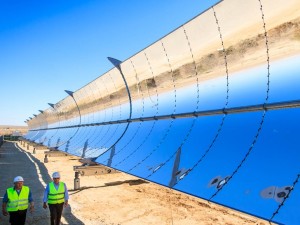Source: inhabitat.com
Published: February 16, 2015
by Joshua Marks
Israeli alternative energy company Brenmiller Energy has solved one of the biggest issues with solar technology — how to generate electricity when the sun sets. The Tel Aviv-based company announced on Monday that it will build a 10-megawatt solar facility in the Negev desert city of Dimona that will generate renewable electricity for around 20 hours per day through an energy storage technology the company has been developing for the past three years. Biomass will be used as a backup during the four hours when the solar power system is not generating electricity.
“Solar power stations integrating storage and backed up by biomass are the best solution for producing electricity in Israel,” said Brenmiller Energy CEO Avi Brenmiller. “Biomass alone cannot meet electricity demand but combining it with solar energy and storage represents the cheapest and cleanest alternative. This combination is a solution for the high costs of burying garbage borne by the local authorities.”
Related: Israel Announces Plans for 121 MW Solar Power Station in the Negev Desert
The 300 million shekel ($77.27 million) project will be built on about 45 hectares (110 acres) and is expected to completed by early 2017. The firm said the project will create about 150 jobs in the area.
The solar facility will generate around 20 hours of renewable electricity on a typical summer day and potentially up to a full 24 hours of solar energy when the sun is shining for nine to 10 hours. During the winter when the sun isn’t strong enough to meet electricity demands, the backup biomass station will work more.
Brenmiller’s bCell™ System stores energy by using parabolic mirrors to track the sun’s rays and collect solar thermal energy. The heat from the solar field is transferred to an underground energy center where the power is stored at a temperature of 550 degrees Celsius (1,022 degrees Fahrenheit). When the clouds cover the sun or day turns to night, the heat is released as steam to power the turbines and keep the electricity flowing.
Via Reuters
Images via Brenmiller Energy

